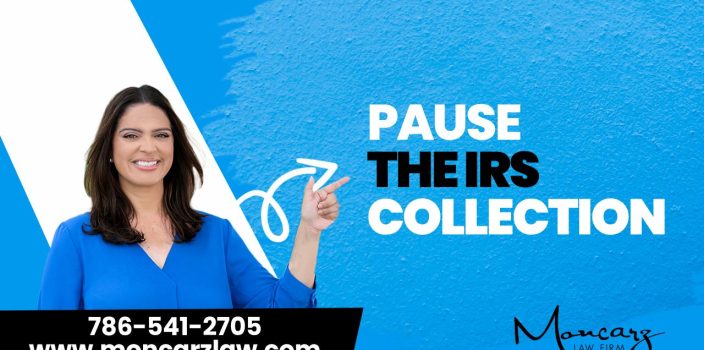Introduction
Dealing with the IRS can be a stressful experience, especially when you’re facing collection efforts for unpaid taxes. But did you know that you can actually put a temporary pause on these efforts? In this blog post, we’ll explore a simple yet effective strategy to halt the IRS collection process, giving you the breathing room you need to get your finances in order. For more information or consultation, you can visit Claudia Moncarz’ Tax Resolution Consultation.
Table of Contents
- Understanding the IRS Collection Process
- How to Put a Collection Hold on Your Account
- When This Strategy Works Best
- What to Do During the Hold Period
- Other Options for Tackling Tax Debt
- Conclusion
Understanding the IRS Collection Process
Before diving into the strategy, it’s essential to understand what the IRS collection process entails. The IRS sends out letters, may contact your employer or clients, and can even put a lien on your property if you have unpaid taxes. The process can be overwhelming, but there are ways to manage it effectively.
How to Put a Collection Hold on Your Account
Step 1: Locate the Latest IRS Letter
Find the most recent letter you’ve received from the IRS. Look for a phone number, usually located in the top right corner of the letter.
Step 2: Make the Call
Call the number and explain that you are in the process of sorting out your finances to tackle the tax debt. Request a collection hold on your account.
Step 3: Negotiate the Hold Period
Depending on the IRS agent you speak with, you could get a hold period ranging from two weeks to eight weeks. This means the IRS will temporarily stop all collection efforts.
Step 4: Document the Details
Once approved, make sure to write down the agent’s name and their IRS identification number. Always ask for these details for your records.
When This Strategy Works Best
This approach is most effective if you don’t have a revenue officer or agent assigned to your case. If you do have an agent, the situation becomes more complicated, and this strategy may not be advisable.
What to Do During the Hold Period
Use this time wisely to explore your options for settling the tax debt. Don’t just breathe a sigh of relief; act on it. You have various options like installment payments and offers in compromise that the IRS provides.
Other Options for Tackling Tax Debt
- Installment Payments: You can negotiate a monthly payment plan.
- Offer in Compromise: This is a settlement option where you pay less than the full amount owed.
Conclusion
Putting a temporary hold on IRS collection efforts can provide you with the time you need to sort out your financial situation. However, it’s crucial to use this time effectively to explore and act on your options for settling the tax debt. Remember, there’s always a solution to your tax woes.
Key Takeaways:
- You can put a temporary hold on IRS collection efforts by calling the number on the latest IRS letter you received.
- This strategy works best if you don’t have a revenue officer or agent assigned to your case.
- Use the hold period to explore your options for settling the tax debt.
For more information or consultation, you can visit Claudia Moncarz’ Tax Resolution Consultation.
Source: Put a pause to the IRS’ collection efforts – YouTube



